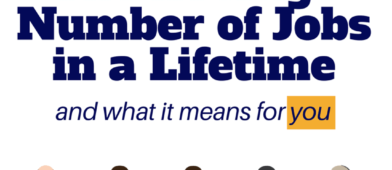I’m never a fan of generational terms like Generation X and Millennials. I prefer to think of life in phases with (optional) milestones. A 25-year-old with a newborn has more in common with a 35-yo with a newborn than he or she does with a 25-yo who is still single. It’s about the phase you are in life, not the number of years you’ve been around.
That being said, it is a convenient name to refer to a large group, many of which will have similar approaches to money.
Just as folks who lived through the Depression as children will often skew more frugal, folks who lost their jobs during the Great Recession will have a different opinion about the stability of their job. It’s as good as you’re going to get if you know anything else about the people in the group.
As someone who straddles Generation X and Millennials, I was born in 1980, I thought it would be interesting to ask some of my more entrenched Millennial blogger friends about their approach to money.
For this, I asked the winner and four finalists of the Plutus Award for Best Personal Finance Blog for Millennials (2015):
- Michelle Schroeder-Gardner of Making Sense of Cents – Michelle’s won the award for Best Personal Finance Blog for Millennials and it’s easy to see why – it is packed with actionable advice. It’s not a blog filled with motivational posts, it’s filled with information you can take and implement right now.
- Amanda Abella of AmandaAbella.com – Amanda is a published author, money coach, and speaker and has one of the most well-designed blogs you’ll ever see. Her book is Make Money Your Honey.
- Stefanie O’Connell of StefanieOConnell.com – What I love about Stefanie’s blog is how personal it is. She shares stories from her life and how those experiences shaped who she is today. She also has a fascinating background in performance, having graduated from NYU with a degree in drama and going to the Philippines as a cast member of the international tour of Cinderella. Wow, right? Wait until you see her answers to my questions. She is the author of The Broke and Beautiful Life.
- Eva Baker of Teens Got Cents – Eva’s been interested in personal finance since she was 16 when she listened to The Total Money Makeover by Dave Ramsey with her mother. As one of the youngest bloggers on this list, she brings a perspective few folks have and one I’ve come to appreciate.
- Kyle Prevost of Young and Thrifty – Kyle is the only Canadian finalist but while our money knows borders, good money practices don’t. Kyle is one half of the team behind his blog, the other is Justin Bouchard, and the two have been featured in many prominent publications for their work with money. They too have a book, More Money for Beer and Textbooks.
Table of Contents
Q. Tell us a little bit about yourself – where you are in your life, career, and your relationship with money?

Michelle: Hello! I’m currently 26 years old and I run the blog Making Sense of Cents full-time. I am currently traveling around North America in an RV with my husband and our two dogs. I have what I believe to be a somewhat good relationship with money, but I am human and still have my downsides even though I am a personal finance blogger. I have no student loans, I just sold my house so that I can travel more extensively, and I am hoping to retire in my early 30s.

Amanda: There are some differences between my early 20s and now. At 22 I graduated from college and went six months without a job. I moved back home and was dealing with some serious anxiety issues. I had no idea how to handle money, I was recovering from a stint of illness and I was out of work.
At the time there were all these news articles about how millennials are lazy, broke, and entitled. I have no idea why but a voice inside of me said “That’s not you. You’ll be fine even in a down economy.” I googled how to start freelance writing online, started a blog, shortly found work afterward and my health started to improve. I have to say that at 22/23 and even parts of 24 I was very controlling, anxious and headstrong. I wanted to make stuff happen and I was very impatient. I was also in victim mode with the whole “Woe is me! What a bad economy! I’m screwed!”
At 25 I quit my job to write and teach full-time and it’s been one lesson in adulthood after another – from buying health insurance to negotiating. I am happy to say that at 27 I’m more steady (for the most part) and I don’t sweat the small stuff as much. I also make more money than I did at a regular job while having way more fun.

Stefanie: In some ways, I find my story to be very stereotypically “millennial.”
I wanted to live my dreams and pursue my passions, so I majored in theater – spending years struggling to make ends meet between professional performing gigs. Money, or lack thereof, became a central focus in my life. My strategy was to find ways of spending less and less to enable the continued pursuit of my passions, but I eventually found myself at a point where the tradeoffs were no longer worth it. I wanted things like health insurance (this was pre-[Affordable Care Act]) and lattes.
So instead of focusing strictly on saving, I worked to increase my earning potential – diversifying my income streams and really honing my skill set – tripling my income and finding that I was as passionate about my new ventures as I was about performing.

Eva: Right now I am a nineteen year old part-time college student while working on my business full time. I am able to save almost half of my income because I live at home. I started saving for retirement two years ago but recently got really serious about it. My hope is to continue growing my website and also take advantage of other opportunities as they come my way.

Kyle: I was quite fortunate to find my wife and my calling (teaching) quite early in life. I recently entered my “late twenties” and while this caused a few moments of discomfort, I am quite happy with my place in the world.
The only debt my wife and I carry is a small amount of her student loans, and a very manageable mortgage. Our investing portfolio is modest relative to where we would like it to be, but is quickly growing!
Q. What’s one money mistake you made that you want to do over again? What were the impacts of that mistake?

Michelle: One money mistake that is still happening is that I spend far too much money on food. There are times when I do very well with my food spending and eat in a lot, but then there are weeks that seem to go by where I spend way too much money on food.

Amanda: One money mistake I definitely made was not negotiating a higher salary. I think because the economy was bad I was happy to just land any job I could. It’s a mindset that followed me into my business but I’m happy to say I’ve done a lot of recovery in that department in 2015 lol.

Stefanie: My biggest mistake was waiting so long to realize my earning potential. I spent years doing jobs I hated – babysitting, working at restaurants, tradeshow hostessing – because I thought they were the only things I could do with my limited experience while still being a performer.
I’ve since found that providing value or solving a problem is enough. You don’t have to have a specific degree, job title or level of experience to position yourself for better career and earnings prospects, you just need to take the reigns and start doing.

Eva: When I was a kid I probably bought more gum than I should have. 🙂 There have been a few times I have purchased things I didn’t need and regretted it but learned my lesson pretty quick. Starting a personal finance blog for teens when I was sixteen has really kept me accountable for how I spend my money.

Kyle: Perhaps the worst money mistake I made as a Millennial was not investing early enough. Warren Buffett is said to have purchased his first stock at eleven – and regretted not starting before that! If I had understood the power of compounding investment returns at a younger age, I hope I would have made an effort to put a little bit away through my teens and college years.
Q. If there was just one action they could take right now to set them on the path for financial success, what would it be and what’s the best way to go about it?

Michelle: The main action I believe a person should take is to create a budget. With a budget, you can see where you are spending too much money, if you need to start making more money (such as through a part-time job), how much money you should be saving for retirement, and more. There are SO many benefits of creating a budget and it is also extremely easy to create one. I recommend opening a Mint or Personal Capital account so that it’s extremely easy.

Amanda: Just read a book about money. It seems trite but it’s very powerful. The first financial book I ever read was Suze Orman’s The Money Book for the Young, Fabulous & Broke. I may not follow all the advice in it, but it did give me a better understanding of financials and it started a snowball effect. I’ve been devouring finance and other kinds of personal development books ever since (I even wrote one! Haha!)

Stefanie: If you can’t tell already, I’m all about earning more. Making more money has really transformed my life. The best financial habits won’t do you much good if you don’t have the means to fund your most basic needs and financial goals.

Eva: Start saving money now and learn to live on less than you make.

Kyle: Pay off your credit card debt ASAP and continue to pay off your monthly balance. I know it’s simplistic and maybe cliche to use that as my “just one action”, but the statistics around high-interest credit card debt continue to shock me. Don’t worry about investing or doing anything “fancy” if you have credit card debt. Keep it simple.
Q. What’s some non-money advice you’d give a Millennial?

Michelle: I recommend everyone start following their dreams. Whether you work a job that allows you to fulfill your dreams on the side or if you reach for your dream job, I think everyone should be doing what they want to do in life. You just never know what may happen in the future!

Amanda: You’re not weird and there’s nothing wrong with you, you’re just a millennial. We have different values than previous generations (flexibility, convenience, etc.) and that’s okay. Embrace them and go after what you truly value. Don’t let anyone stop you – including yourself.

Stefanie: What you want can and should evolve as you do. This is something I recently wrote about in my piece on “pursuing your passions:”
To change course has become mistakenly synonymous with failure, and to avoid this so-called failure, many stay the course of the original goal or dream, even when the passion has passed.
I have many friends and acquaintances who would gladly leave show business if they could complete one Broadway contract. That is not the pursuit of a passion – it is the avoidance of “failure”, and it prolongs pursuit long past the expiration of passion.
Think of how your interests changed from the time you were 10 to the time you were 20. Why should you expect them to stay the same between 20 and 30 or 30 and 40 or any other prolonged period of time?

Eva: Everyone needs a mentor. As a young millennial I have a trusted friend who I talk to about personal things and then have two business mentors, Ruth Soukup of Living Well Spending Less and Steve Stewart of stevestewart.me. All three have made a profound impact on my life and helped guide me through some very difficult decisions. Of course my business partner (who also happens to be my mom) is an amazing mentor but it’s important to have other trusted people in your life other than your mom!

Kyle: When interacting with prior generations try to keep in mind that they may not share several characteristics with your generational cohort – for better or for worse. In fact, it helps to go a step beyond and become familiar with what people older than yourself tend to value and relate to relative to your fellow Millennials. Whether in a business or informal context, this perspective will help you relate to others and not unintentionally create a negative impression.
Q. Can you tell us one “bad” money move you made that you have zero regrets about?

Michelle: One bad money move is that I took out more in student loans than I actually needed. While this sounds bad, I believe that it led me to where I am today and it ended up working out in my favor. I honestly don’t believe I would have ever started my blog if I didn’t have student loans.

Amanda: Oh there are a couple. I spent $6,000 on a life coaching certification it turns out I didn’t need haha! I don’t regret it because I do use some of the skills I learned even though people mostly come to be for help with their business problems. I also quit my job before I’d fully replaced my income from my side business. Honestly, I had no idea what I was doing. I’d budgeted the best I could but truthfully I went on a gut feeling that was telling me I could make more money on my own. Turns out I was right.

Stefanie: Working in theater. While I could’ve been smarter in my approach, particularly in regards to survival jobs between gigs, my years working in professional theater have been instrumental in shaping who I am. I don’t know that I’d have my business today without that experience, nor would I have traveled across Asia, around South America or toured the US (twice) for free.

Eva: Deciding to delay graduation by only going to college part time. I don’t think it’s a bad money decision but there are a lot of people who believe my top priority should be an education. I have decided to make my business my top priority instead. Not everyone gets it and that’s okay with me! Zero regrets!

Kyle: My wife and I spent a little more on our engagement ring and destination wedding that we initially intended (still well under the average), but got to share the time of our lives with many of our closest friends and family. In hindsight we feel the two-week adventure represented great value for our money, even though from a wealth-building perspective it was counterproductive to go over budget.
Q. What do you look forward to in the coming years?

Michelle: There are many things I look forward to in the coming years. I am looking forward to continuing my travels, eventually starting a family, retiring, and more.

Amanda: People freak out about aging but I find that life gets better (as if I’m that old – ha!). If I was able to make so much progress between 22 and 27 – financially, emotionally, relationship-wise, etc. – then the sky is the limit for the rest of my life.

Stefanie: Everything. Now that I’ve boosted my income, I feel so much more freedom of choice and opportunity. I also have minimal obligations. At 29, I’m in good health, I’m my own boss, I don’t have children to worry about – I can do anything I want and I absolutely adore it. I took a nap at 3pm today. I went to Jamaica last week. Maybe I’ll fly out to Colorado to ski next month. I really relish my freedom and living on my own terms. It took me a while to get here, and now that I have, I’m celebrating!

Eva: I tend to be the kind of person who has very few friends but the ones I have are amazing! I would like to work on developing more friendships and being a little more outgoing. My biggest financial goal is to purchase a home and I’m working on saving for that now. I absolutely love working with the teens who read my blog and the clients I work with as well. I’m just loving life right now and am overwhelmed with gratitude and how much fun my ‘job’ is everyday. In that regard I hope nothing changes!

Kyle: I look forward to not understanding the unique foibles of the next generation (Generation Z? iGen?) and consequently looking down on them patronizingly.
I also look forward to enjoying the world of innovation that is constantly evolving around me. My first interaction with a computer was when I was about 8-years-old. Two decades later we have jumped from that $8,000 word processor that you could play PacMan on, to a small 2-D rectangle that has taken the place of several dozen appliances from yesteryear and created entirely new paradigms.
Finally, I look forward to realizing the fruits of my labour when it comes to compounding investing!
If you want to learn more about them, I urge you to check out their blogs and follow them on social media! Links below.
- Michelle Schroeder-Gardner of Making Sense of Cents – Twitter @senseofcents and Facebook
- Amanda Abella of AmandaAbella.com – Twitter @amandaabella and Facebook
- Stefanie O’Connell of StefanieOConnell.com – Twitter @stefanieoconnel and Facebook
- Eva Baker of Teens Got Cents – Twitter @teensgotcents and Facebook
- Kyle Prevost of Young and Thrifty – Twitter @youngandthrifty and Facebook




Loved reading everyones responses. Thanks for including mine!
Thanks for participating!
Very cute interviews! =)
Love this. Thanks for including me!
Jim, great article about Millennials! And you are on the cusp of Millennial/GenX according to Wiki. For someone who doesn’t like to be labeled, good job with being born in 1980 😛
I don’t care as much about the labelling part as much as the accuracy of it, to categorize people based on their birth year seems a little too broad. 🙂
I couldn’t agree more. However, it’s important because your target market could be a particular category that people do choose to identify with. And sometimes people don’t want to be labeled; and yet their spending habits and lifestyle are characteristic of their generation. Whether we like it or not, Gen identity is extremely important in terms in of business and economics. For instance, you won’t find Vans marketing to the Baby Boomer Generation.
I think maybe it’s because my experience with demographic targeting started online and so you have finer granularity – there’s no need to target Gen X or Gen Y when you can target Age X, Married or Single, with/without Kids, etc – characteristics that are far more illustrative of a person than the year they were born. 30 with a kid is a completely different than 30 without a kid. Heck, 30 with a child on the way is far different than 30 without. 🙂
Great interview post! I love it!
I am in the Gen X group – born in the early 70’s. What I love to see is how these bloggers started focusing on these areas so early in their adult years. They were creating independent income streams and managing their money. It has taken me longer to get to that point. Instead, I was more focused on the job market. Getting as high a paying job as possible. I worked many long, long hours and in fairness did earn good money. But it is a “success trap.” The more you earn, the more you spend, the more you… Read more »
The success trap is avoidable 🙂 — but I know what you mean.
Thank you for interviewing me! Looks like I’m in good company 😉
Fun read. Thanks for sharing everyone!
I’m on the tail end of the baby boomers so a little older than most interviewed. I enjoy hearing the perspective of those coming up behind me. My advice to anyone in their 20s or 30s is pretty basic – start saving money for retirement now. Give up the nicer car, the bigger apartment so you can put more money in the bank and let it grow. You want to have fun when you’re young and it’s hard to think about 30 or 40 years down the road, but if you make some sacrifices now, you’ll thank your younger self… Read more »